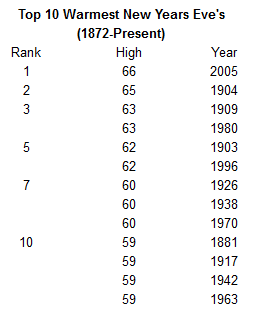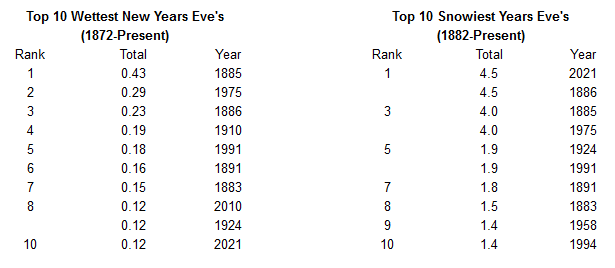As the countdown to 2024 begins, the residents of Denver, Colorado, can look forward to a calm and mild celebration this December 31st. This is not always the case when ringing in the new year. To gain insight into what Colorado’s weather can do let’s take a journey through Denver’s New Year’s Eve climatology, examining temperature extremes, precipitation records, and the likelihood of a serene winter night.
Temperature Extremes Averages:
In 2005, the warmest New Year celebration occurred with the high temperature reaching 66°F, creating a pleasant atmosphere for revelers. In contrast, the coldest New Year’s Eve unfolded in the year 1900, with temperatures plummeting to a bone-chilling -19°F. On average, Denver experiences a high of 40.2°F and a low of 15.4°F on New Year’s Eve, contributing to what is expected to be a chilly but tolerable winter night. This is similar to what we will expect this year.
Top 10 Warmest and Coldest New Year’s Eve: The list of the top 10 warmest New Year’s Eves features years like 2005, 1904, and 1996, while the coldest include the frigid nights of 1900, 1898, and 2014. These extremes showcase the diverse weather conditions that have graced the city throughout its history.
 |  |
Precipitation Records:
Denver’s New Year’s Eve has seen its fair share of wet and snowy celebrations. The wettest celebration occurred in 1885, with 0.43 inches of precipitation, while the snowiest was in 2021, blanketing the city with 4.5 inches of snow. The historical chance of snow on New Year’s Eve stands at 20%. However, the last time measurable snow occurred on this festive night was in 2021. This year’s forecast suggests a break from recent snowy celebrations, promising a calm and mild night for Denverites. Years like 1885, 1975, and 1886 top the list for the wettest New Year’s Eves, while the snowiest celebrations include 2021, 1886, and 1885.
 |
Conclusion:
As we anticipate another New Year’s Eve in Denver, the forecast paints a picture of a calm and mild celebration, adding another chapter to the city’s rich climatological history. From the warmth of 2005 to the frigidity of 1900, and from the wetness of 1885 to the snowiness of 2021, Denver’s December 31st celebrations continue to be a testament to the meteorological diversity of this vibrant city. So, whether you’re bundled up against the cool breeze or enjoying a serene night, Denver’s New Year’s Eve promises a unique and memorable weather experience.
